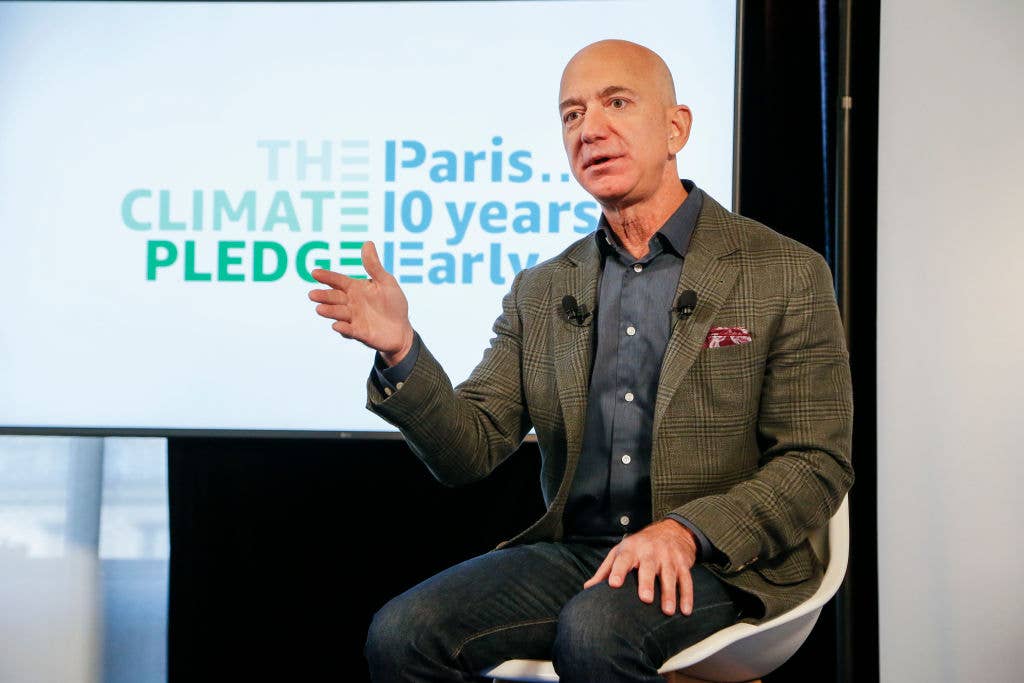
Amazon Invests $2 Billion to Fight Climate Change, Reach Net-Zero Carbon by 2040
Amazon announced that it is investing $2 billion into a venture capital fund to back companies developing “sustainable and decarbonizing technologies." The fund is a part of Amazon’s Climate Pledge, announced last September, committed to meet the goals of the Paris climate agreement by 2040, a decade ahead of schedule.
Amazon is launching the $2 billion venture capital fund to will back companies building “sustainable and decarbonizing technologies,” the company announced Tuesday. The goal is to "reach net zero carbon by 2040, a decade ahead of the Paris Agreement."
The fund will invest in companies in sectors such as trucking and logistics, clean energy, food and farming, and manufacturing and packaging, where reducing greenhouse gasses and carbon emissions will have the biggest impact on climate change. The $2 billion is an “initial” commitment, which is expected to grow over time.
“Companies from around the world of all sizes and stages will be considered, from pre-product start-ups to well-established enterprises,” CEO Jeff Bezos said in a statement. “Each prospective investment will be judged on its potential to accelerate the path to zero carbon and help protect the planet for future generations.”
Bezos announced Amazon’s Climate Pledge last September with the goal of becoming carbon neutral by 2040. He said the company intends to reach the goals of the Paris climate agreement, a decade ahead of the Paris deadline of 2040. In 2017 the Trump administration withdrew the U.S. from the Paris climate agreement.
The full statement by Amazon into its $2 Billion commitment:
"We remain steadfast in our focus on meeting The Climate Pledge—our commitment to reach net zero carbon by 2040, a decade ahead of the Paris Agreement.
"Today we have released our annual update on our sustainability programs, with our latest commitments, initiatives, and performance around the world. We also announced The Climate Pledge Fund, which will further accelerate investment in innovations for the low-carbon economy of the future. This dedicated venture investment program—with an initial $2 billion in funding—will invest in visionary companies whose product and service solutions will facilitate the transition to a low carbon economy.
"In 2019, we made a big bet on the capabilities of our company to innovate, use our scale for good, and go faster to address the urgency of the climate crisis. We also launched The Climate Pledge, inviting other companies to join with us on this path. Last week, we announced that Verizon, Reckitt Benckiser (RB), and Infosys joined The Climate Pledge—sending an important signal to the market that demand is growing rapidly for products and services that help reduce carbon emissions.
"Amazon also confirmed that it intends to run on 100% renewable energy by 2025, five years earlier than previously planned. To date, Amazon has 91 renewable energy projects, including 31 utility-scale wind and solar projects and 60 solar rooftops on fulfillment centers and sort centers around the globe. Together, these projects totaling over 2,900 MW of capacity will deliver more than 7.6 million MWh of renewable energy annually, enough to power 680,000 U.S. homes, and we plan to continue investing, including in the deployment of 100,000 electric vehicles from Rivian, some of which will start hitting the road in 2021.
"Last September we also launched the $100 million Right Now Climate Fund that is investing in nature-based solutions and reforestation projects around the world, including recent investments in in the U.S and Germany. We also remain committed to reducing waste in our packaging, and since 2015, we have lowered the weight of outbound packaging by 33% and eliminated more than 880,000 tons of packaging material, the equivalent of 1.5 billion shipping boxes.
"At Amazon, we first began discussing the possibility of company-wide net-zero commitments during a senior planning summit in 2016. We knew that to continue to be a relentlessly resilient and innovative business, we would need to deeply understand what is happening on our planet. We also knew that we would need to build and dedicate financial resources, intellectual capital, and change management work to creating the tools, data, and understanding about how to achieve these types of commitments.
"Four years later, our bold commitment to integrating sustainability across the company has not changed, and it will not change another five or ten years from now. What has changed, however, is the way in which we are conducting our business, running our operations, funding and implementing new technologies and services that decarbonize and help preserve the natural world, along with the ambitious goals we have set, starting with The Climate Pledge. We’re all in on our goals and our work to build a better planet.
More From The Beet






